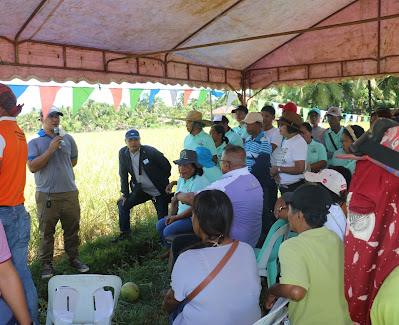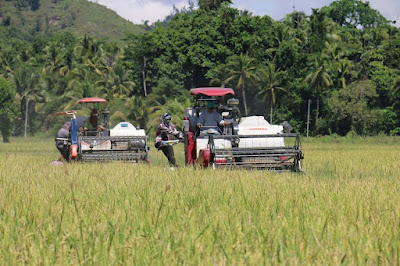Farmers celebrate increased rice production, improved buying price on hybrid rice
By Nida
Grace P. Barcena
CARRASCAL, Surigao del Sur -- The Department of Agriculture (DA) - Caraga, in partnership with the local government unit of Carrascal in Surigao del Sur, recently marked its ‘Rice Harvest Festival’ to celebrate the success of the season-long technology demonstration on hybrid rice in Sitio Maslog, Barangay Panikian.
About 100 hectares of various hybrid rice varieties were showcased at
the techno-demo farm sites in Carrascal town as part of the DA’s 500-hectare
community hybrid rice clustered demo farm established in the province of
Surigao del Sur, including the municipalities of San Miguel, Madrid, and
Cantilan.
The activity showcased a very promising opportunity for the
farmer-cooperators to adopt hybrid technology to rice, as they aimed to produce
a minimum of 4.0 metric tons (MT) per hectare and more in every cropping
schedule, as the result significantly contributed to Carrascal’s 40% increase
in rice production.
It also provided a higher palay farm-gate price, an average of P21.50 to
P22 per kilogram, from the previous buying price of P17 to P19 per kilo.
The Hybrid Rice Program, according to the Philippine Rice Research
Institute (PhilRice), focuses primarily on rice breeding and research to
develop high-performing, good-quality, insect-, pest-, and disease-resistant
varieties that will increase grain yield and the income of farmers. This
program provided all farmer-cooperators of the techno-demo in Caraga region
with agricultural inputs such as seeds, fertilizer, and technical and extension
support.
In terms of yield, the nationwide average yield of hybrid rice is 4 to 8
MT per hectare, which is higher than that of traditional inbred varieties that
can provide only 3-5 MT per hectare. Thus, hybrid rice varieties demonstrated
significantly higher yields compared to the other, contributing to an improved
overall production level.
Additionally, hybrid rice plants tend to exhibit greater uniformity in growth,
maturity, and grain quality, resulting in better buying prices.
As hybrid rice proved to increase yield, Enocencio Minguez, the focal
person for the hybridization program, stressed the importance of continuing the
program to encourage farmers to adopt hybrid technology.
“We will continue to invite more farmers to go into hybrid rice because
it will help increase productivity and income. All hybrid seeds are good. But
this techno demo will help the farmer determine the highly productive and most
suitable variety in the locality,” Minguez emphasized.
The same delight was felt by the farmers in the municipality of Bunawan,
Agusan del Sur, during their harvest in the 100-hectare hybrid rice technology
demonstration located at Sitio Babadan, Brgy. Libertad, Bunawan, Agusan del
Sur.
The techno demo farm in Bunawan is part of the 1000-hectare community
hybrid rice clustered demo farm established at ten farm sites in the province.
Domingo Gaorano, chairperson of the Babadan Irrigators Association,
shared that his inbred rice production could only reach 100 bags per hectare,
but when he tried the hybrid rice, it reached 130 bags per hectare. This coming
harvest, he is expecting 5.6 metric tons or more per hectare.
DA-Agricultural Program Coordinating Office (APCO) provincial chief June
Anthony Ouano congratulated the farmers-cooperators for the bountiful harvest.
He also thanked the local government unit of Bunawan for accepting the
challenge of organizing and embracing this technology and innovation, with emphasis
on the fact that this is a good step to foster agriculture and heighten the
farmers' income.
"We will always find a way to alleviate the lives of our farmers,
and this is one way: increasing rice production. So, we are here to give you
more knowledge on how to increase your production and eventually increase your
income," Quano underscored.
DA-PhilRice further affirmed that planting hybrid rice is one way to
improve competitiveness, as it could increase yield and reduce production costs
per kilogram of palay.
“With this, a possible hybrid rice derby will be initiated during the
next cropping season or period to intensify the farmers' usage of hybrid rice
seed varieties,” Carrascal agriculturist Japhet C. Sugian revealed.
The plan for the hybrid derby is in support of President Ferdinand
Marcos Jr.'s program to adopt hybrid rice as a better alternative to the inbred
variety for increased crop production. It also aims to ensure better yield and
better income for the farmer-cooperators and to compete well with farmers in
terms of production from other municipalities.
In the bargain, the government also pushed for sustainable supply and
availability of hybrid seeds to address operational expenses for farmers,
including production-related and post-harvest machinery, small-scale
irrigation, as well as extension and training activities.
As considered a breakthrough in agriculture, the Hybrid Rice Program will boost and strengthen rice production in the country, as the government is optimistic that it will attain its rice self-sufficiency target within two years through increased adoption of hybrid rice technology among our farmers. (RLE/NGPB, PIA-Surigao del Sur)


